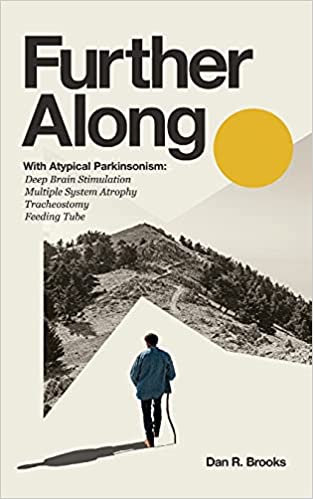
Q&A with Dan Brooks
What impact has DBS had on your life?
Going forward with DBS surgery was a difficult decision because of the understood risks and potential complications. Once the neurosurgeon met with us and reassured me of the benefit he believed DBS would be to me, we determined to go forward with it. After the surgery, I was able to move better, without a wheelchair. I walked for 6-8 years with a cane and walker most of the time. I have gradually had to use a walker more of the time and a wheelchair out of the home, but the July 2012 DBS gave me a number of years of better mobility than I would have had. My shaking and swallowing were helped by it, the shaking and involuntary jerky movements improve for periods of three months after adjustments to the generator. Typically, I have these adjustments 4 times per year, and when the time approaches to have them, I notice more jerkiness and difficulty moving around the house. My swallowing gets more difficult. When I am adjusted, I do better for those next several months. My neurosurgeon told me that this would give me a better quality of life and extend my life. I believe the increased mobility for a time, and improved quality of life, have helped me to live with more health and allowed the family interaction that has sustained me.
What would you like everyone to know about Atypical Parkinsonism?
That there are other neurodegenerative diseases in addition to Parkinson’s disease and Alzheimer’s disease. This is important because these other syndromes— Lewy body disease, frontotemporal dementia, progressive supranuclear palsy, corticobasal syndrome, and multiple system atrophy— are faster progressing and a shortened life is expected. Parkinson’s Disease is often the first diagnosis given for these diseases and as things progress, an atypical parkinsonism diagnosis may be determined. Sharing this information with sensitivity in Parkinson’s disease support groups and other senior gatherings is important for three reasons: 1) In the event that a P.D. diagnosis is changed to atypical parkinsonism in the progression of a given patient, 2) There is a need universally for a greater understanding of these rarer conditions in the Parkinson’s community in order to welcome these patients who have a hard time finding a place to share their challenges and concerns with others who have more common conditions, 3) The medical community needs more knowledge and awareness in order to better recognize the atypical parkinsonism syndromes in order to treat them earlier in their progression, which becomes even more critical because of the faster progression and severe complications.
You have managed, over many years, to stay mentally strong despite multiple, evolving diagnoses and challenging complications. How do you stay strong? How do you, as you say, keep moving forward?
Having purpose and a sense of the long view of what life is about, helps me to face the pitfalls of daily living as well as the risk of a shortened life. Knowing that I have a family that I love and that loves me gives me the sense that I am here for a reason. They need me. I have grown sons who are living their lives as husbands, fathers, and professionals that need my example and listening ear. I am here for them. Encouraging and guiding my grandchildren is important. I love and admire my daughters-in-law and benefit so much from their care and friendship. Above all, Karrie, my wife, is my first priority and I find happiness in our simple life we spend together— laughing, talking, planning and hoping together. She worked hard to bring me home from the nursing home and if it weren’t for her, I would need to be there now. I have so much to be thankful for and these things keep me moving forward. I can’t forget that my activities— playing the guitar and mandolin, reading, participating in an online virtual Bible study group and atypical parkinsonism support groups are really uplifting and motivating.
What role does your faith play?
My faith in God is my foundation of meaning and purpose for my life. It has been the central theme of everything I have done throughout my life, as a young man, a husband, as a father, as a principal of schools and as a singer/guitarist— everything I have done has been focused on my faith and belief that there is a greater meaning and direction for our lives. Beyond the things we pursue and desire, is the calling on our lives to give our all to the God that made us and desires the best for us. I formed these beliefs as a young teen and have chosen to sustain that faith in the face of challenges and questions because I see through history that people who place their faith in God have woven a thread through the ages and generations. I believe because I have experienced the joy and inspiration that God has provided as my source of strength and motivation throughout my life, and it has enabled me to face the darkest days of my illness.
By nature of this chronic disease, we as PwPs are obliged to work with many medical professionals, who we sometimes forget are human, with all that that entails. What advice would you offer PwPs on how to manage his / her relationship with his/her neurologist and other medical professionals?
I think we need to be our own advocate. We also should understand that Parkinson’s disease is a difficult disease to diagnose and every single individual case is different. There are solutions that are universally beneficial but there is no one size fits all. It is important to communicate and to work with your doctor, not seeing them as opposition. The better we prepare for a consultation with our doctors the more they will understand our needs and are able to respond with needed treatments and referrals for services. A PwP such as yourself, Christopher, knows this because you are well-read and are choosing to provide education and inspiration for patients and their families. Your website is a great example of what a patient can do to make a difference and live with forward motion in your life. Thank you for interviewing me and providing a review of my book, FURTHER ALONG with Atypical Parkinsonism.

